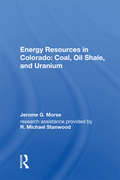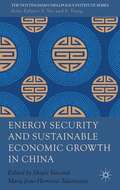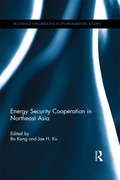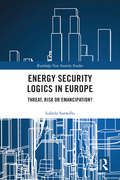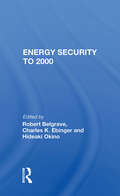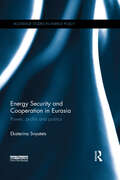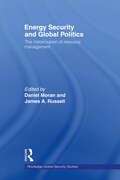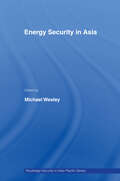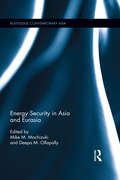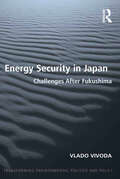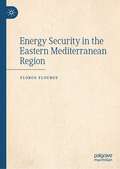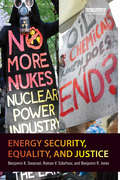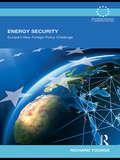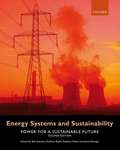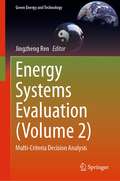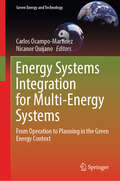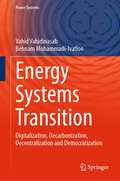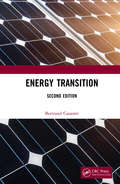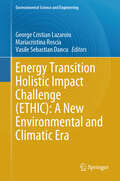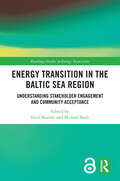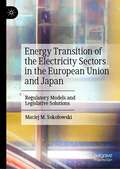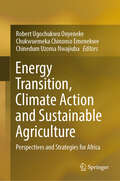- Table View
- List View
Energy Resource Assessment
by Alfred PetrickThe basic concepts utilized in analysis of non-renewable energy resources are presented in this study. Dr. Petrick explains the process of exploration in terms of the present value of expected discoveries, efficiency in exploration, and the budgeting process, stressing objectives and strategies designed to help avoid "gambler's ruin" and aid in the efficient spending of exploration dollars. The case of a wildcat oil-gas prospect in Colorado illustrates the fundamentals of petroleum evaluation, including calculation of reserves and the expected value of discovery. The history of the Ekofisk discovery in the North Sea serves as an example of the stages of large-scale petroleum development, including financing and cost evaluation. Discussions and a case history of the Cerrejon project in Colombia are also given. Dr. Petrick closes with a chapter on cost estimation, clarifying the concepts used in order-of-magnitude cost estimation of minerals and fuels projects.
Energy Resources In Colo/h: Coal, Oil Shale And Uranium
by Jerome G. MorseAs the rate of energy use far outstrips the estimate of what resources may be available, other fuels are needed to supplement dwindling supplies of oil and gas. Three such alternatives are coal, oil shale, and uranium, all of which exist in potential abundance in Colorado. However, large-scale production of these resources will result in complex interactions with the state's social and physical environment, and the technologies and issues involved must be fully identified and understood before full-scale development takes place. This book provides current information on coal, oil shale, and uranium resources in the state, as well as on the potential impact of the technology associated with their development. Initially prepared as three separate volumes intended to inform policymakers in the legislative and executive branches of state government, this single volume has been expanded and brought up to date for a broader audience.
Energy Security And Sustainable Economic Growth In China
by Shujie Yao Maria Jesus HerreriasThis book focuses on various issues of energy, energy efficiency and environmental policy in China. It discusses different aspects on how China may maintain its fast economic growth through good management of energy consumption and development of various energy sources.
Energy Security Cooperation in Northeast Asia (Routledge Explorations in Environmental Studies)
by Jae H. Ku Bo KongDrawing on cutting-edge research from leading scholars, this book investigates state preferences for regime creation and assesses state capacity for executing these preferences in Northeast Asia’s energy domain, defined as the geographical area comprising the following countries: Russia, Mongolia, China, Japan, South Korea and North Korea. It examines questions pertaining to how states perceive the need and necessity for establishing a regime when it comes to the issue of energy and how much commitment they make to the effort in Northeast Asia. The book analyses the factors that shape each country’s fundamental energy interests in the region, how these interests impact their attitudes toward engaging the region on energy security and the way they carry out their regional engagement. Based on countries’ interests in promoting institutionalized regional energy cooperation and their capacity for forging that cooperation, the collection assesses each state’s role in contributing to an energy regime in Northeast Asia. It then concludes with a critique on the decade-plus quest for energy security cooperation in Northeast Asia and suggests ways forward for facilitating regional energy security cooperation. This book will be of great interest to scholars and students of environmental policy, energy policy, security studies, Asian studies and international relations.
Energy Security Logics in Europe: Threat, Risk or Emancipation? (Routledge New Security Studies)
by Izabela SurwilloThis book analyzes energy security dynamics in Europe through the prism of security logics. Drawing on the literature on securitization, security logics and security contexts, it scrutinizes energy security debates and policy developments in Germany, Poland and Ukraine, focusing on the pipeline politics, nuclear energy and renewables sector. The contextualized analysis accounts for the wider historical, socio-economic and cultural background from which energy policies emerge and gives a voice to the different stakeholders—from policymakers to the local NGO sector. The book sheds light on the root causes of different energy policy decisions and illustrates that European energy security is currently driven by four security logics—war, subsistence, risk and emancipation. The logic of emancipation is a newly emergent phenomenon embraced by many bottom-up citizens’ initiatives and manifested in their drive to self-reliance, the rhetoric of liberation and local practices of energy production. The conceptualization and analysis of the emancipatory logic vis-à-vis other energy security logics help to explain European energy context most effectively—with its background conditions, emerging trends and often controversial national policy approaches. This book will be of much interest to students of critical security studies, energy policy and European politics in general.
Energy Security To 2000
by Robert BelgraveThis report is the product of a research project carried out during 1986 jointly by the National Institute for Research Advancement, Tokyo; the Centre for Strategic and International Studies, Washington; and the Royal Institute of International Affairs, London. The views expressed are those of the authors, and not necessarily those of any of the institutions mentioned above, or of the numerous officials and experts whose advice has been sought.
Energy Security and Cooperation in Eurasia: Power, profits and politics (Routledge Studies in Energy Policy)
by Ekaterina SvyatetsWhy are bilateral relations, especially in the area of energy security, so different in the cases of U.S.-Russia, U.S.-Azerbaijan, and Russia-Germany energy deals? Why do some states find common ground despite differences, while others, with all the seemingly favourable conditions, are sinking into animosity? Energy Security and Cooperation in Eurasia explores varying outcomes of energy cooperation, defined as diplomatic relations, bilateral trade, and investment in oil and natural gas. The book looks at economic potential, geopolitical rivalry, and domestic interest groups in the cases of U.S.-Russia, U.S.-Azerbaijan, and Russia-Germany energy ties. It looks at major projects in each case (Sakhalin and Arctic oil and gas production, Baku-Tbilisi-Ceyhan and Nord Stream pipelines) and activities of international oil companies. The book also provides a detailed analysis of the situation in Ukraine since 2014 and Russia’s annexation of Crimea, and their effect on European energy security. This book utilizes an innovative approach of exploring the dyads of states (bilateral relations) along the economic, geopolitical, and domestic lobbying dimensions. This book is a valuable resource for graduate and undergraduate students, academics and researchers in the areas of Security, Political Economy, Comparative Politics, post-Soviet studies, as well as for general public.
Energy Security and Global Politics: The Militarization of Resource Management (Routledge Global Security Studies)
by James A. Russell Daniel MoranThis book analyses the strategic dimensions of energy security, particularly where energy resources have become the object of military competition. The volume explores the risks that may arise from conditions of increasing economic competition and resource scarcity, and the problems that may follow if major producers or consumers of energy lose con
Energy Security in Asia (Routledge Security in Asia Pacific Series)
by Michael WesleyThis book explores the various dimensions of energy security in Asia – which has become an increasingly important geopolitical issue. Reputable international contributors look at the roles played by each of the major energy importers: the United States, China, Japan and India, as well as the main suppliers: the OPEC states, Russia, the Central Asian states and Australia. In each case, the domestic politics of energy security are investigated, and state interests and perspectives on the issue are considered. Analyzing the policy and security aspects of energy security, the book includes an examination of: the geopolitics of energy competition strategic, economic and environmental dimensions the impacts of energy security on human security. With energy security being one of the central issues facing the world today, this book is a timely and impressive appraisal of the major energy security issues facing Asia.
Energy Security in Asia and Eurasia (Routledge Contemporary Asia Series)
by Mike M. Mochizuki Deepa M. OllapallyMany states appear to have strong sentiment on energy security and energy transit vulnerability. Some analysts see the rapidly increasing demand for energy and competition for energy resources leading to nationalistic energy policies. Others argue that global trends with efficient energy markets and growing options on renewables suggest more relaxed energy outlooks. This book focuses on Asia, where global demand for energy is now concentrated in the aspiring and rising powers of the region: China, India, Japan and South Korea, and also recognises the importance of Russia as a growing energy supplier. Contributions by experts in the field provide detailed and parallel case studies. Shedding light on the ongoing debate in the literature regarding energy outlooks of major Asian states, they analyse whether energy policies are expected to evolve along market oriented cooperative lines or more competitive and even destructive mercantile, nationalist lines. The book argues that states are not unitary actors even in the key energy security arena and there are competing and contrasting viewpoints in Asian states on energy security. It suggests that domestic debates structure thinking on energy security, making energy policy more contingent than assumed by purely market or geopolitical logics. Providing a strong contribution to comparative energy security studies, the book fills an important gap in the literature on energy and national security and offers a basis for conducting further inter-state, interactive analysis. It will be of interest to researchers on Asian Studies, energy politics and international relations.
Energy Security in Europe
by Kacper SzuleckiThis edited collection highlights the different meanings that have been attached to the notion of energy security and how it is taken to refer to different objects. Official policy definitions of energy security are broadly similar across countries and emphasize the reliability and affordability of access to sufficient energy resources for a community to uphold its normal economic and social functions. However, perceptions of energy security vary between states causing different actions to be taken, both in international relations and in domestic politics. Energy Security in Europe moves the policy debates on energy security beyond a consideration of its seemingly objective nature. It also provides a series of contributions that shed light on the conditions under which similar material factors are met with very different energy security policies and divergent discourses across Europe. Furthermore, it problematizes established notions prevalent in energy security studies, such as whether energy security is 'geopolitical', and an element of high politics, or purely 'economic', and should be left for the markets to regulate. This book will be of particular relevance to students and academics in the fields of energy studies and political science seeking to understand the divergence in perspectives and understandings of energy security challenges between EU member states and in multilateral relationships between the EU as a whole.
Energy Security in Japan: Challenges After Fukushima (Transforming Environmental Politics and Policy)
by Vlado VivodaFor a country already uneasy about energy security, the 2011 earthquake and tsunami, which caused a nuclear catastrophe at the Fukushima nuclear power plant, turned pre-existing Japanese concern about the availability of energy into outright anxiety. The subsequent closure of many nuclear reactors meant Japan needed to replace lost power quickly and so had no choice but to secure additional fossil fuels, undermining Japanese diversification policy and increasing global and regional competition for energy. This switch has been at a cost to the already weak Japanese economy whilst the increase in fossil fuel consumption has caused a significant increase in greenhouse gas emissions. In this book Vlado Vivoda examines the drastically changed environment following the disaster in order to analyse Japan’s energy security challenges and evaluate Tokyo’s energy policy options. Looking at how the disaster exacerbated Japan’s existing energy security challenges, Vivoda considers the best policy options for Japan to enhance national energy security in the future, exploring the main impediments to change and how they might be overcome.
Energy Security in the Eastern Mediterranean Region
by Floros FlourosThis book aims to provide an overview of crucial aspects related to the interconnection between the political economy of energy security and national security, which is of great importance globally due to high volatility and complexity. In this book, contemporary energy issues in relation to the energy security are examined, along with main vulnerabilities and challenges that have appeared lately with an impact beyond country borders and with a particular focus on the Eastern Mediterranean region. Energy security is studied on both International and European level and finally the Eastern Mediterranean region with special reference to the countries of the State of Israel and the Republic of Cyprus. The rapidly changing geopolitical environment makes energy security one of the critical areas of immediate interest that need a holistic approach. The importance of energy security in the Eastern Mediterranean region is constantly growing and requires the proper vision to enhance security in the region. Energy is now linked to the issues of sustainable development and tackling climate change, which is also taken into account. Finally, this book is expected to contribute to the existing literature and provide an in-depth study that gives a fresh approach to the academic and political community.
Energy Security, Equality and Justice
by Benjamin K. Sovacool Roman V. Sidortsov Benjamin R. JonesThis book applies concepts from ethics, justice, and political philosophy to five sets of contemporary energy problems cutting across time, economics, politics, geography, and technology. In doing so, the authors derive two key energy justice principles from modern theories of distributive justice, procedural justice, and cosmopolitan justice. The prohibitive principle states that "energy systems must be designed and constructed in such a way that they do not unduly interfere with the ability of people to acquire those basic goods to which they are justly entitled." The affirmative principle states that "if any of the basic goods to which people are justly entitled can only be secured by means of energy services, then in that case there is also a derivative entitlement to the energy services." In laying out and employing these principles, the book details a long list of current energy injustices ranging from human rights abuses and energy-related civil conflict to energy poverty and pervasive and growing negative externalities. The book illustrates the significance of energy justice by combining the most up-to-date data on global energy security and climate change, including case studies and examples from the electricity supply, transport, and heating and cooking sectors, with appraisals based on centuries of thought about the meaning of justice in social decisions.
Energy Security: Europe's New Foreign Policy Challenge (Routledge Advances in European Politics #Vol. 53)
by Richard YoungsThe geopolitics of oil and gas have made a spectacular return to the international political agenda. The European Union (EU) has recognized the importance of incorporating energy security more systematically into foreign policy. It has committed itself to pursuing an energy security policy based on market interdependence, European unity and long-term governance improvements in producer states. In offering the first broad, global assessment of the foreign policy dimensions of EU energy security, this book considers how far these commitments have been implemented. Examining how the EU’s general approach to energy security has played out in the specific political contexts of different countries and regions, distinctive features of the book include: a thorough analysis of current EU strategies towards energy security, assessing the EU as an international actor a key focus on the governance structures of producer states including the Middle East; Russia, Central Asia and the Caspian, and Sub-Saharan Africa a major addition to debates surrounding markets and geopolitics, informing both international relations and international political economy This book will be of interest to students, scholars and policy makers in the fields of European/EU Politics, energy politics, foreign policy and International Relations.
Energy Security: Policy Challenges and Solutions for Resource Efficiency
by Nikolai Mouraviev Anastasia KoulouriThis book discusses energy policy within the framework of the expansion of renewable energy sources (RES) and increasing resource use efficiency. In this book, the term ‘resource efficiency’ is defined as deriving the most value from resource inputs related to energy production, while incorporating energy efficiency. The authors highlight the drivers, policy approaches, governance issues and management problems related to the reduction of dependency on fossil fuels by focusing on RES and resource efficiency. Mouraviev and Koulori argue that enhancing energy security requires a new approach, integrating two core components: the emphasis on increasing energy production from renewable sources and resource use efficiency, which forms a contrast to the traditional understanding of energy security as security of supply. Blending theory with practice using several case studies, this original book provides a novel conceptualisation of energy security that will be of interest and value to practitioners and policy makers as well as scholars and researchers.
Energy Systems And Sustainability: Power For A Sustainable Future
by Godfrey Boyle Bob Everett Stephen Peake Janet RamageHow can we provide clean, safe, sustainable energy supplies for the world despite rising population levels and increasing economic development? Today, energy and sustainability are of primary concern and form the focus of this book and its companion volume, Renewable Energy. Interdisciplinary in its approach and global in its perspective, this book provides a contemporary exploration of the economic, social, environmental, and policy issues raised by current systems of energy use, as well as describing their key physical and engineering features. The historical evolution of the world's energy systems, the principles underlying their use, and their present status and future prospects are analysed, while emphasizing the important issue of sustainability. Beginning with a survey of basic energy concepts, the book describes the magnitude and patterns of human energy needs at various levels. Focus then turns to an overview of the fossil and nuclear-fuelled energy that, together with hydroelectric power and traditional biofuels, supply most of the world's commercial energy needs. Sections on economics describes the basic methods by which the monetary costs of energy are calculated, and discuss the issue of 'external' costs of energy production. The concluding chapters consider the sustainabliity problems associated with both fossil and nuclear fuel use, and ways in which they might be ameliorated by various technological and social developments. This is done in the context of a rising use of renewable energy. · Extensive coverage of the important concepts and issues underpinning modern energy production and its future prospects · Adopts an interdisciplinary approach making the text readable by engineer and policy maker alike Online Resource Centre The Online Resource Centre to accompany Energy systems and Sustainability features: For students: · Links to sources of further information and up-to-date energy statistics · Self-assessment questions For registered adopters of the book: · Figures from the book, available for download
Energy Systems Evaluation: Multi-Criteria Decision Analysis (Green Energy and Technology)
by Jingzheng RenThis book presents various multi-criteria analysis methods for sustainability-oriented analysis and decision-making for energy systems, under various different conditions and scenarios. It presents methodologies to answer the questions relating to which of the options are the most sustainable among the alternatives, and how multi-criteria decision analysis methods can be used to select the most sustainable energy systems. A systematic innovative methodological framework is presented, which enables the most appropriate energy system to be selected under different conditions including: Scientific decision support tools for sustainable energy system selection; Fuzzy, grey, and rough sets based multi-criteria decision analysis; Decision-making models under uncertainties; and The combination of life cycle thinking and multi-criteria decision analysis This book is of interest to researchers, engineers, decision makers, and postgraduate students within the field of energy systems, sustainability, and multi-criteria decision analysis.
Energy Systems Integration for Multi-Energy Systems: From Operation to Planning in the Green Energy Context (Green Energy and Technology)
by Carlos Ocampo-Martinez Nicanor QuijanoThis book offers a comprehensive approach to energy systems integration (ESI) that optimizes the design and operation of energy systems, maximizing the benefits of all components while minimizing potential negative impacts. By coordinating the production, distribution, and utilization of energy from diverse sources, ESI ensures the most efficient and cost-effective fulfillment of end-users' needs. The true value of ESI lies in its ability to harmonize interconnected systems, enabling the production and supply of energy in its various forms to achieve reliability, environmental sustainability, and economic viability at appropriate scales. Through the analysis and design of integrated energy systems, often referred to as multi-energy systems (MES), decision-makers and industry professionals gain valuable insights into the optimal strategies required to fulfill these objectives while considering contextual conditions and operational constraints. The book explores the design, modeling, supervising, and controlling of energy systems but also examines how these approaches can be seamlessly integrated into future MES through innovative and ESI processes. Through its comprehensive analysis and forward-thinking approach, this book serves as a vital resource for researchers, practitioners, and policymakers seeking to navigate the complexities of energy systems integration and leverage the potential of renewable energy for a sustainable future.
Energy Systems Transition: Digitalization, Decarbonization, Decentralization and Democratization (Power Systems)
by Behnam Mohammadi-Ivatloo Vahid VahidinasabEnergy Systems Transition: Digitalization, Decarbonization, Decentralization, and Democratization provides a thorough multidisciplinary overview of the operation of modern green energy systems and examines the role of 4D energy transition in global decarbonization mitigation efforts for meeting long-term climate goals. Contributions present practical aspects and approaches with evidence from applications to real-world energy systems, offering in-depth technical discussions, case studies, and examples to help readers understand the methods, current challenges, and future directions. A hands-on reference to energy distribution systems, it is suitable for researchers and industry practitioners from different branches of engineering, energy, data science, economics, and operation research.
Energy Transition
by Bertrand CassoretThis book presents both the importance of energy transition and its associated difficulties. Energy Transition, Second Edition, provides an explanation of the physical concepts of energy and power and also reviews global energy consumption and our dependence on energy. The book discusses the links between the economy and energy. It explains the drawbacks and dangers of different energy sources and tries to compare them. By reviewing future energy resources, it evaluates several transition scenarios. The book shows that the laws of physics prevent the emergence of simple, pleasant solutions, but it proposes potential solutions and encourages readers to develop better processes from energy sources to production to consumption. This book will be of interest to engineers and undergraduate and graduate students studying and working in various fields of energy; producers of fossil, gas, oil, coal, electric, renewable, and nuclear energy; and anyone interested in better understanding these fundamental problems for our future. FEATURES Discusses the current issues with energy transition Covers several energy transition scenarios and their associated difficulties Presents the links between economy and energy Highlights the importance of a global discussion of energy Encourages the development of better, improved processes in energy sources from production to consumption
Energy Transition Holistic Impact Challenge (Environmental Science and Engineering)
by George Cristian Lazaroiu Mariacristina Roscia Vasile Sebastian DancuThis book states that the new environmental challenge will also have to be faced ethically, science can provide the tools, but people will have to be sensitized so that they make their own environmental ethics. The challenge of the new era is: the environment and therefore the climate, as it does not start outside of us, but as a constituent element of our life and therefore lived ethically. The new vision proposed in this book is to push technology together with the human being, in assuming environmentally ethical behaviors: this is the greatest collective action of humanity. Sustainable development has allowed an integrated key to the social, economic, and environmental dimensions. Through ethics, sustainability can be combined not only by referring to the problem of pollution and the exploitation of natural resources, but it creates a new global era that includes all dimensions of people's lives and of society. The shared and structured environmental ethics allow an approach that is no longer short-term but provide the collective tools to look far in time. With this book, we want to lay the instrumental, technical, social, and legislative foundations, to provide a new methodology for the care of the environment, as up to now, there has been much discussion, but little achieved in a truly ethical way.
Energy Transition in the Baltic Sea Region: Understanding Stakeholder Engagement and Community Acceptance (Routledge Studies in Energy Transitions)
by Farid Karimi and Michael RodiThis book analyses the potential for active stakeholder engagement in the energy transition in the Baltic Sea Region (BSR) in order to foster clean energy deployment. Public acceptability and bottom-up activities can be critical for enduring outcomes to an energy transition. As a result, it is vital to understand how to unlock the potential for public, community and prosumer participation to facilitate renewable energy deployment and a clean energy transition – and, consequently, to examine the factors influencing social acceptability. Focussing on the diverse BSR, this book draws on expert contributions to consider a range of different topics, including the challenges of social acceptance and its policy implications; strategies to address challenges of acceptability among stakeholders; and community engagement in clean energy production. Overall, the authors examine the practical implications of current policy measures and provide recommendations on how lessons learnt from this ‘energy lab region’ may be applied to other regions. Reflecting an interdisciplinary approach in the social sciences, this book is an essential resource for scholars, students and policymakers researching and working in the areas of renewable energy, energy policy and citizen engagement, and interested in understanding the potential for bottom-up, grassroots activities and social acceptability to expedite the energy transition and reanimate democracies.
Energy Transition of the Electricity Sectors in the European Union and Japan: Regulatory Models and Legislative Solutions
by Maciej M. SokołowskiThis book provides a comprehensive overview of the energy policies in the European Union and Japan in terms of electricity markets and climate action, including energy efficiency, renewable energy sources, and the reduction of emissions. The book evaluates and compares the regulatory frameworks for achieving energy transitions by answering a number of questions focused on the essence and range of the regulatory models used by leading global economies which herald carbon neutrality by 2050. The book provides a useful framework that systematises Japanese and European energy policies and legislation including electricity-related policies, plans, and programmes. Discussing these issues in relation to the European and Japanese 2050 energy transition the author delves into the four pillars of the transition: market reform, reduction of emissions, promotion of renewables, and enhancing energy efficiency. Each chapter demonstrates the timing of the actions undertaken both in Europe and Japan; analyses the character of the conducted actions, evaluates the stakeholders of the realised agenda; and presents the technologies involved in the energy transition.
Energy Transition, Climate Action and Sustainable Agriculture: Perspectives and Strategies for Africa
by Robert Ugochukwu Onyeneke Chukwuemeka Chinonso Emenekwe Chinedum Uzoma NwajiubaThis book offers a comprehensive exploration of climate justice intertwined with energy transitions, specifically focusing on the unique challenges and opportunities in developing countries. It presents a series of in-depth studies and discussions across various dimensions such as legal frameworks, economic incentives, gender issues, and the socio-economic impacts of energy policies. By dissecting complex relationships like those between renewable energy consumption and employment in Nigeria as well as the impacts of financial development, official development assistance, institutional quality and foreign direct investment on energy transition in Africa, this book illuminates the multifaceted nature of sustainable development. Starting with an overarching introduction to the imperatives of climate justice and the necessity for energy transition, the book delves into detailed analyses including the challenges and opportunities in renewable energy, the impacts of fossil fuel dependency and reforms, and the critical role of legal and institutional frameworks in supporting just transitions. Subsequent chapters discuss the gender-specific impacts of energy policies, the potential of international partnerships, and the entrepreneurial ventures emerging within just energy markets. Further, the book addresses public engagement, the educational imperatives for climate and energy literacy, and the intricate links between climate-induced migration, conflicts, and energy policies. It also explores the economic frameworks that can facilitate a just transition, evaluates the role of carbon markets in climate justice, and assesses how energy transitions impact water and food security. The book concludes by synthesizing key findings and offering strategic recommendations for integrating climate justice into energy transition policies. This final chapter provides actionable insights for policymakers, stakeholders, and communities aimed at fostering sustainable and equitable energy solutions. Targeted at policymakers, academics, and professionals involved in energy and climate policy, as well as students and researchers, this book serves as an essential resource for anyone committed to advancing sustainable and just energy transitions in developing countries.

